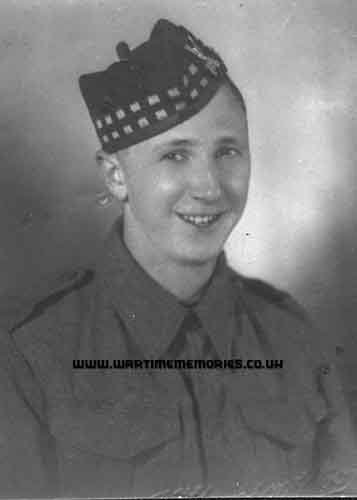Pte. George Dunbar
British Army Royal Scots
from:2 Garthdee Crescent, Aberdeen, Scotland
Born at Malcolm Road, Peterculter, Aberdeen, Scotland, George Dunbar was the second eldest of 4 children. As a young boy, the family moved to 102 John Street, Aberdeen, Scotland, where his mother ran a shop at next door at 104. His father worked at the Culter Paper Mill. He attended the Demonstration School at John Street, an educational estabishment where teachers under training worked alongside regular teachers. George left school at 14 years of age and worked as a delivery boy with Whitehall Laundry. Next worked as a pageboy, complete with uniform and pill box hat, at the City Cinema, George Street, Aberdeen and a few months later worked in a granite yard as an apprentice sawyer. In 1940, his family moved to 373 Anderson Drive North, Aberdeen and he obtained employment at a specialist hardware and furniture store, MacMillans. He started an apprenticeship as a plumber with Gorrod, Forest Avenue, Aberdeen and at age 17.
With the Second World War in its third year, George wanted to join the RAF as an air gunner. He was refused because his occupation was on the reserve list. He also tried the navy, but was turned down for the same reason. He enlisted in the army on 20th of January 1943 and gave his occupation as a message boy, and once accepted, told them that he was an apprentice plumber. His brother William was in the Royal Scot Guards. George trained at Cameron barracks, near Inverness, Scotland, and passed as a track laying vehicle driver. He volunteered for Commando training, with three other soldiers from Glasgow, who were more tough than he, and they thought that he would not pass the fitness exam. The three failed and he was accepted and underwent 10 weeks of training. He joined No. 6 Commando Unit at Brighton.
In 1944, he was part of the D-Day landings in Normandy, France and fought in Belgium. After a time, due to losses, he was sent back to England for re-grouping and was later sent back to the front line. During a 10 day leave period, he was married at 2 Garthdee Crescent, Aberdeen, the home of his wife Elizabeth's parents, on 25th of December 1944 and should have been back on duty on 31st December but stayed for the New Year and arrived back two days late. He was sentenced to 21 days unpaid duty. The Commando Unit was sent back for duty in Belgium and on the 24th January 1945 he was wounded in the back and shoulder with shrapnel. He was sent to a hospital in Brussels and then flown back to a hospital in Aberdeen. He was allowed home during the day and had to return to the hospital in the evening. He was posted to a hospital near Edinburgh and eventually discharged as fit for duty. When given a medical examination, he was found to be unfit for the Commando Unit and he volunteered to join the Military Police and was trained in Germany. He was discharged from the armed services on 20th July 1946 but held in reserve until 1952.

